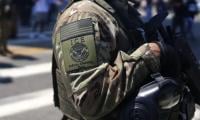Around 1,000 bodies recovered from Balochistan in six years
ISLAMABAD:Nearly a thousand bullet-ridden corpses have been recovered from various parts of Balochistan in the past six years, official documents revealed, indicating a disturbing sign that the security of the country's largest province is worsening yet again. More than 51 percent mutilated bodies were identified as ethnic Baloch.
Official figures continued to reveal shocking figures further as stating that 22 percent dead bodies belonged to Pashtuns while rest of the bullet-ridden corpses either remained unidentified or belong to Punjabis, Afghan refugees or non-Muslims.
More than 940 dead bodies were recovered from various districts of Balochistan whereas Quetta remained the worst-hit district with 346 dead bodies were recovered since 2010, revealed figures prepared by senior officials assigned to swiftly execute the National Action Plan (NAP).
The confidential data, also exclusively available with Geo News (ASKKS Programme)/The News, further revealed that over 112 persons were still missing in the province. With these rights violations, official figures further shocked that over 658 innocent people lost their lives in sectarian incidents where total 1, 837 were killed either in target killings or other disputes after 2011 in the province. Over 3, 470 people were injured in terror or sectarian related incidents during this period.
Security forces, with help of intelligence agencies and operators of newly established Intelligence Fusion Cell (IFC) recovered over 498 dead bodies of Baloch during this period in the province which already lags behind other provinces in terms of over nine key social indicators.
Around 159 dead bodies of Pashtuns were recovered from various parts of the province while security forces could not identify 175 bullet-ridden corpses as their faces were completely burnt and spoiled. The police also recovered around 108 dead bodies of other people where some of them were identified as Afghan refugees and Punjabis.
The report also revealed that Kalat was the second largest district after Quetta where 268 dead bodies were recovered by law enforcing agencies. After Quetta and Kalat, over 171 dead bodies were recovered in this district by the police. In terms of worst rights violence, 2011 witnessed recovery of 203 dead bodies, 129 in 2015, 165 in 2014, 168 in 2013, 166 in 2012, 102 in 2010 and 17 bullet-ridden bodies were recovered this year (2016).
Official data further revealed that over 2,654 intelligence based operations were conducted by the law enforcement agencies soon after the Army Public School massacre in December 2016.
More than 335 criminals were killed and 73 were injured in these operations, data revealed, over 13,362 criminals have been arrested in last eighteen months. Law enforcement agencies have recovered 4,154 illegal weapons and 248,327 rounds of ammunition were recovered from criminals.
The Intelligence Fusion Cell took the lead over police and Levies as it arrested 7, 597 criminals, killed 288 terrorists and recovered 242,105 rounds of ammunition since the NAP started. On recent killings and recovery of dead bodies in Balochistan, Home Minister of the province Sarfraz Bugti said, "Balochistan witnessed a significant drop down in violence -- this momentum will go on by grace of Allah." In response to queries by media that fatal attacks on policemen and FC personnel were on the rise, he claimed, "We will not let Baloch separatists and other militants to flex their muscles yet again."
On this alarming situation, Senator (ex) Sana Baloch, commented: "Balochistan is in a political crisis and it needs a well-sequenced roadmap to undo the damage and reverse the cycle of violence."
In order to prevent further political and human catastrophe or repeat of another cycle of violence in the province, he said, "a combination of economic collapse, Talibanisation, sectarian menace,abductions for ransom, near-to-collapsed health and education infrastructures, corruption and brutally mismanaged governance have brought the province to the verge of a Somalia-like situation where the ordinary citizen begs state-backed criminals, gangs and mafias for safety and security."
-
 Gracie Abrams Follows 'Kylie Jenner Playbook' With Paul Mescal Romance
Gracie Abrams Follows 'Kylie Jenner Playbook' With Paul Mescal Romance -
 Dua Lipa Shares 'Love Letter' With New Boyfriend After Emily Ratajkowski Confirms Romance With Her Previous Beau
Dua Lipa Shares 'Love Letter' With New Boyfriend After Emily Ratajkowski Confirms Romance With Her Previous Beau -
 Brazilian Beauty Influencer Passes Away After Suffering 'medical Emergency'
Brazilian Beauty Influencer Passes Away After Suffering 'medical Emergency' -
 Sarah Ferguson Turns Into A Bulldozer With Beatrice, Eugenie: ‘Help Me Out’
Sarah Ferguson Turns Into A Bulldozer With Beatrice, Eugenie: ‘Help Me Out’ -
 Australian Prime Minister's Letter Against Andrew Mountbatten-Windsor Made Public
Australian Prime Minister's Letter Against Andrew Mountbatten-Windsor Made Public -
 'Project Runway' Alum Tim Gunn Reveals Why He's Been Celibate For 43 Years
'Project Runway' Alum Tim Gunn Reveals Why He's Been Celibate For 43 Years -
 Delroy Lindo Breaks Silence On John Davidson's Racial Slur Shock At 2026 BAFTA: 'We Did What We Had To Do'
Delroy Lindo Breaks Silence On John Davidson's Racial Slur Shock At 2026 BAFTA: 'We Did What We Had To Do' -
 King Charles Prepares Next Move As Andrew Shows No Remorse
King Charles Prepares Next Move As Andrew Shows No Remorse -
 Epstein's Brother Invited To Discuss Royal Family's Future After Andrew's Arrest, On Popular Show
Epstein's Brother Invited To Discuss Royal Family's Future After Andrew's Arrest, On Popular Show -
 BAFTA Winner Robert Aramayo Defends Director's Racial Slurs Amid Tics
BAFTA Winner Robert Aramayo Defends Director's Racial Slurs Amid Tics -
 Prince William, Kate Middleton’s Troubles Take On A New Face: ‘They’re Steeling Themselves’
Prince William, Kate Middleton’s Troubles Take On A New Face: ‘They’re Steeling Themselves’ -
 'Coronation Street' Star Sally Ann Matthews Finally Reveals Why She Quit ITV Soap
'Coronation Street' Star Sally Ann Matthews Finally Reveals Why She Quit ITV Soap -
 Prince Andrew's Major Sacrifice For Princess Beatrice, Eugenie Royal Titles Revealed
Prince Andrew's Major Sacrifice For Princess Beatrice, Eugenie Royal Titles Revealed -
 ICE Agent Misfired Bullet Into Minnesota Hotel’s Guest Room
ICE Agent Misfired Bullet Into Minnesota Hotel’s Guest Room -
 Andrew Mountbatten-Windsor, Fergie Still Counting On Each Other? Deets
Andrew Mountbatten-Windsor, Fergie Still Counting On Each Other? Deets -
 Piers Morgan Reacts To Photo With Ghislaine Maxwell
Piers Morgan Reacts To Photo With Ghislaine Maxwell



